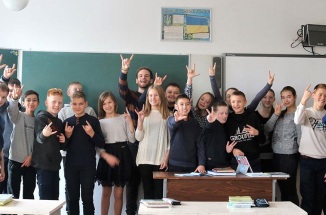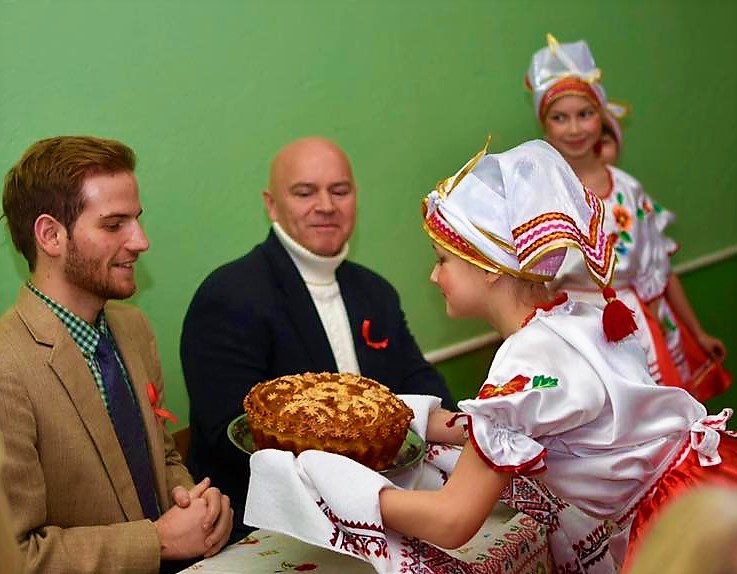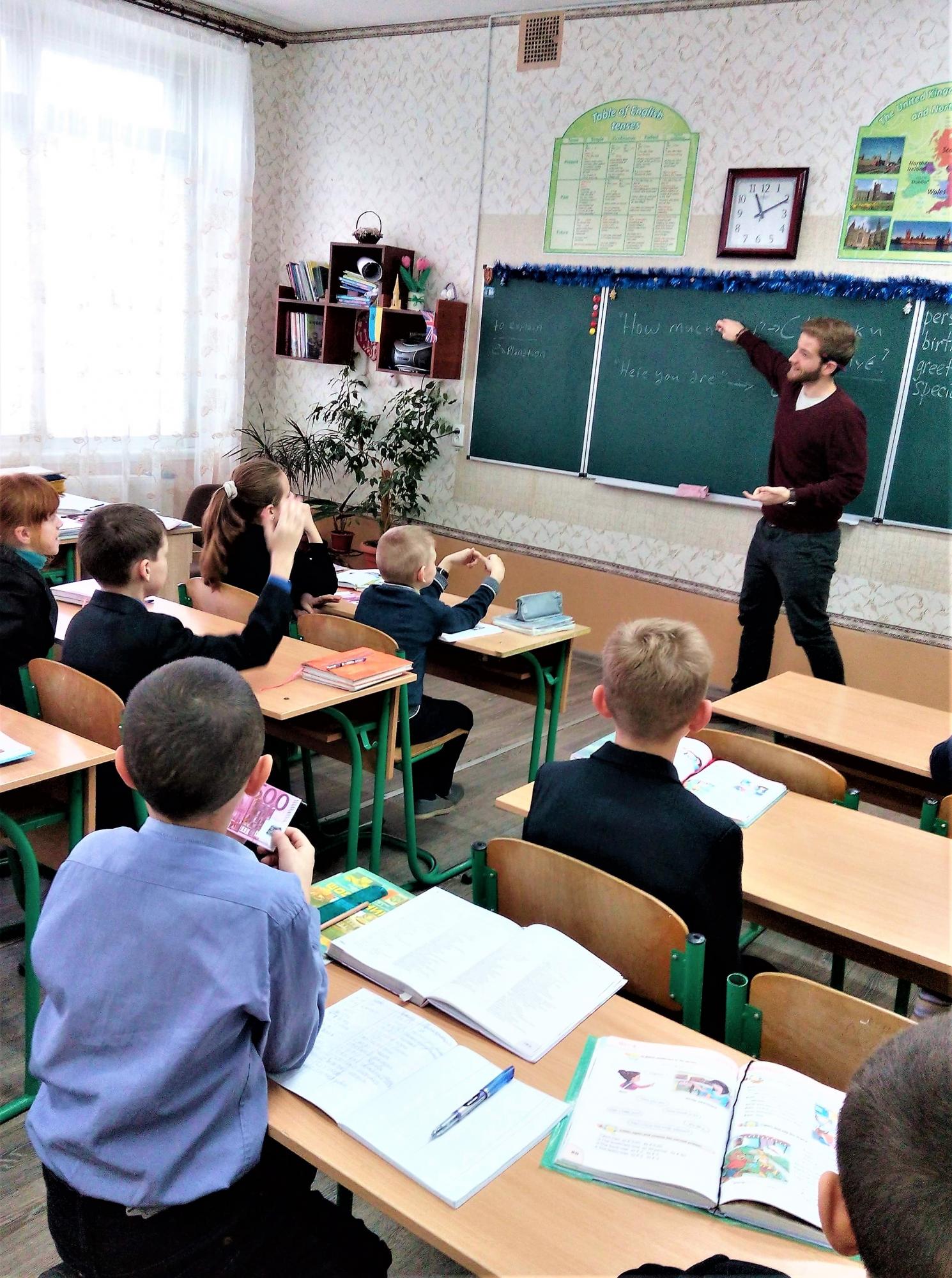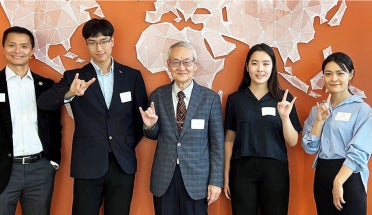
Meet Austin Wilson '17, Peace Corps Volunteer in Ukraine
- Feb 22, 2018
- Peace Corps
Making the choice to invest yourself in service a Peace Corps Volunteer can be daunting, but the return on that investment is substantial. For Austin Wilson, becoming a Peace Corps Volunteer has granted him more than just the opportunity to obtain invaluable cross-cultural and language skills.
"Peace Corps has allowed me to meet those who I know will be lifelong friends and has given me a sense of self-confidence that no other experience can provide," he said.
Wilson graduated from The University of Texas at Austin in spring 2017 with a major in European Studies and a minor in Government.
We caught up with him during the early stages of his service as a Teaching English as a Foreign Language (TEFL) Volunteer in Dnipropetrovsk Oblast, Ukraine, to learn about his decision to join Peace Corps and his experience so far.

Why did you decide to join Peace Corps?
Initially, I began looking at Peace Corps simply as a backup option for after graduation. The more I learned about the organization, however, the more I realized that it was actually a perfect match for my interests and goals.
When I received my invitation to serve, I accepted without hesitation because I knew I wanted to learn a new language, live in a new country, and gain both personal and professional insights from an international perspective.
What is your role as a volunteer?
My role as a volunteer is to team-teach English in a secondary school, conduct English clubs and activities (both in the school and community), and develop teachers’ methods and approaches to teaching English. I will be here until December 2019.
Tell us about your community and location.
My community is situated in central/eastern Ukraine and has a little over 20,000 people. The geography is fairly flat with some occasional hills. Many people have plots of land on which they farm or maintain gardens. I’m also nearly an hour by bus from the nearest big city, Dnipro, which has about 1 million people and plenty to do in terms of shopping, eating, and entertainment.
People in my community speak Ukrainian, Russian, and a combination of the two known as “Surjek.” We have everything from grocery stores to coffee shops to open-air markets (‘bazaars’). The town also has a large park with walking trails, a community pool, and stadium for various sports.
Describe your job and what you do in a typical day.
A typical day for me somewhat resembles that of a teacher in the United States. I go to school around seven thirty in the morning, teach some classes, and finish up in the afternoon. I normally spend my time after school in my favorite coffee shop preparing for other classes, clubs, or seminars.
On certain days I conduct an English club at the school. We discuss a wide range of topics including why Beyoncé is royalty, what it means to "slay" in American slang, and the Ukrainian’s interpretation of "covfefe.”

Other than the school’s class schedule, my work days can vary greatly depending on my current project or the needs of the community. As a volunteer, it’s absolutely essential to be flexible.
I currently live with a host family so after my work day I spend some time with them eating, practicing my language skills, and learning more about Ukrainian culture.
What is your favorite part about being a Peace Corps Volunteer?
My favorite part about Peace Corps is that my job puts me in contact with a wide variety of not only Ukrainian professionals but also a diverse and talented group of people from the US. Everyone has such different life experiences, and it’s incredibly satisfying to connect with so many interesting individuals.
What are the hardest parts of being a Peace Corps Volunteer?
The hardest part of being a PCV is reminding myself to stay focused on why I joined in the first place. It can be tempting to look at the lives of others and think, “I wish I were doing that instead right now…” However, I know that despite the bad days, I signed up to make a difference.
How would you describe your service?
Peace Corps service is intriguing, frustrating, challenging, rewarding, encouraging, vexing, but mostly enlightening. There are good and bad days, twists and turns you don’t expect, and moments where you genuinely have no idea what’s going on, but I wouldn’t trade it for the world.
What have you learned about yourself through your service?
I always considered myself to be a flexible person, but my limits have truly been tested during my time at Peace Corps. There are so many moving parts and variables that can change and sometimes it is quite difficult to maintain a positive attitude while being effective at your job. However, I think I’ve done that well and I am [now] much more comfortable taking things as they come.
How will your service impact your career goals?
After having gained significant language skills in Ukrainian and Russian, in addition to two years working in a cross-cultural environment, I’m confident in my prospects for finding future employment either in government or a field related to international relations.
What are your plans after you complete your service?
I plan to do some more solo traveling in parts of the world I haven’t yet seen. I also plan to attend graduate school somewhere in Europe. Ideally, I would like to remain in Europe to live and work.
What would you say to current UT students considering applying to Peace Corps?
If you’re considering applying to Peace Corps, start preparing now. Think about the sector in which you might like to serve. Either way you go, volunteering is a great way to get started and Austin has plenty of opportunities to get involved.
Secondly, study abroad! If it’s feasible, go for as long as possible. I spent a year studying abroad and it was by far the best preparation for Peace Corps that I could have had. There are experiences you have while living in a different country that simply cannot be replicated, and they will serve you well during your two-year commitment.
Take time to complete the application thoroughly and to the best of your ability. Use all the resources available to you to ensure that your application is top-notch. Don’t rush through it just to get it done.
Finally, don’t be afraid to reach out to anyone that you know who is or was a volunteer. They are always willing to answer your questions and help out however they can.
Learn more about becoming a Peace Corps Volunteer



